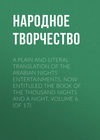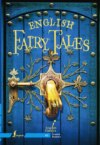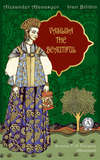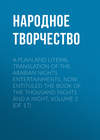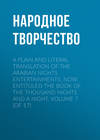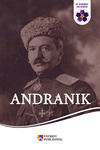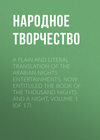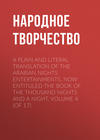Czytaj książkę: «A plain and literal translation of the Arabian nights entertainments, now entituled The Book of the Thousand Nights and a Night. Volume 6 (of 17)», strona 15
THE THREE WISHES, 215 OR THE MAN WHO LONGED TO SEE THE NIGHT OF POWER
A certain man had longed all his life to look upon the Night of Power,216 and one night it befel that he gazed at the sky and saw the angels, and Heaven’s gates thrown open; and he beheld all things prostrating themselves before their Lord, each in its several stead. So he said to his wife, “Harkye, such an one, verily Allah hath shown me the Night of Power, and it hath been proclaimed to me, from the invisible world, that three prayers will be granted unto me; so I consult thee for counsel as to what shall I ask.” Quoth she, “O man, the perfection of man and his delight is in his prickle; therefore do thou pray Allah to greaten thy yard and magnify it.” So he lifted up his hands to heaven and said, “O Allah, greaten my yard and magnify it.” Hardly had he spoken when his tool became as big as a column and he could neither sit nor stand nor move about nor even stir from his stead; and when he would have carnally known his wife, she fled before him from place to place. So he said to her, “O accursed woman, what is to be done? This is thy list, by reason of thy lust.” She replied, “No, by Allah, I did not ask for this length and huge bulk, for which the gate of a street were too strait. Pray Heaven to make it less.” So he raised his eyes to Heaven and said, “O Allah, rid me of this thing and deliver me therefrom.” And immediately his prickle disappeared altogether and he became clean smooth. When his wife saw this, she said, “I have no occasion for thee, now thou are become pegless as a eunuch, shaven and shorn;” and he answered her, saying, “All this comes of thine ill-omened counsel and thine imbecile judgment. I had three prayers accepted of Allah, wherewith I might have gotten me my good, both in this world and in the next, and now two wishes are gone in pure waste, by thy lewd will, and there remaineth but one.” Quoth she, “Pray Allah the Most High to restore thee thy yard as it was.” So he prayed to his Lord and his prickle was restored to its first estate. Thus the man lost his three wishes by the ill counsel and lack of wit in the woman; “And this, O King” (said the Wazir), “have I told thee, that thou mightest be certified of the thoughtlessness of women and their inconsequence and silliness and see what cometh of hearkening to their counsel. Wherefore be not persuaded by them to slay thy son, thy heart’s core, who shall cause thy remembrance to survive thee.” The King gave ear to his Minister’s words and forebore to put his son to death; but, on the seventh day, the damsel came in, shrieking, and after lighting a great fire in the King’s presence, made as she would cast herself therein; whereupon they laid hands on her and brought her before him. He asked her, “Why hast thou done this?” and she answered, “Except thou do me justice on thy son, I will cast myself into this very fire and accuse thee of this on the Day of Resurrection, for I am aweary of my life, and before coming into thy presence I wrote my last will and testament and gave alms of my goods and resolved upon death. And thou wilt repent with all repentance, even as did the King of having punished the pious woman who kept the Hammam.” Quoth the King, “How was that?” and quoth she:—I have heard tell, O King, this tale concerning
THE STOLEN NECKLACE
There was once a devotee, a recluse, a woman who had devoted herself to religion. Now she used to resort to a certain King’s palace,217 whose dwellers were blessed by her presence and she was held of them in high honour. One day she entered that palace according to her custom and sat down beside the King’s wife. Presently the Queen gave her a necklace, worth a thousand dinars, saying, “Keep this for me, O woman, whilst I go to the Hammam.” So she entered the bath, which was in the palace, and the pious woman remaining in the place where the Queen was and awaiting her return laid the necklace on the prayer-carpet and stood up to pray. As she was thus engaged, there came a magpie218 which snatched up the necklace, while she went out to obey a call of nature and carrying it off, hid it inside a crevice in a corner of the palace-walls. When the Queen came out of the bath, she sought the necklace of the recluse, who also searched for it, but found it not nor could light on any trace of it; so she said to the King’s wife, “By Allah, O my daughter, none hath been with me. When thou gavest me the necklace, I laid it on the prayer-carpet, and I know not if one of the servants saw it and took it without my heed, whilst I was engaged in prayer. Almighty Allah only knoweth what is come of it!” When the King heard what had happened, he bade his Queen put the bath-woman to the question by fire and grievous blows,–And Shahrazad perceived the dawn of day and ceased saying her permitted say.
Now when it was the Five Hundred and Ninety-seventh Night,
She said, It hath reached me, O auspicious King, that when the King bade his Queen question the bath-woman with fire and grievous blows, they tortured her with all manner tortures, but could not bring her to confess or to accuse any. Then he commanded to cast her into prison and manacle and fetter her; and they did as he bade. One day, after this, as the King sat in the inner court of his palace, with the Queen by his side and water flowing around him, he saw the pie fly into a crevice in a corner of the wall and pull out the necklace, whereupon he cried out to a damsel who was with him, and she caught the bird and took the necklace from it. By this the King knew that the pious bath-woman had been wronged and repented of that he had done with her. So he sent for her to the presence and fell to kissing her head and with many tears sought pardon of her. Moreover, he commanded much treasure to be given to her, but she refused and would none of it. However, she forgave him and went away, swearing never again to enter any one’s house. So she betook herself to wandering in the mountains and valleys and worshipped God until she died, and Almighty Allah have mercy upon her! And for an instance of the malice of the male sex (continued the damsel), I have heard, O King, tell this tale of
THE TWO PIGEONS. 219
A pair of pigeons once stored up wheat and barley in their nest during the winter, and when the summer came, the grain shrivelled and became less; so the male pigeon said to his wife, “Thou hast eaten of this grain.” Replied she, “No, by Allah, I have never touched it!” But he believed not her words and beat her with his wings and pecked her with his bill, till he killed her. When the cold season returned, the corn swelled out and became as before, whereupon he knew that he had slain his wife wrongously and wickedly, and he repented whenas repentance availed him naught. Then he lay down by her side, mourning over her and weeping for grief, and left meat and drink, till he fell sick and died. “But” (added the damsel), “I know a story of the malice of men more extraordinary than either of these.” Quoth the King, “Let us hear what thou hast to tell;” and quoth she:—I have heard tell, O King, this
STORY OF PRINCE BEHRAM AND THE PRINCESS AL-DATMA
There was once a King’s daughter, who had no equal in her time for beauty and loveliness and symmetrical stature and grace, brilliancy, amorous lace and the art of ravishing the wits of the masculine race and her name was Al-Datmá. She used to boast, “Indeed there is none like me in this age.” Nor was there one more accomplished than she in horsemanship and martial exercises and all that behoveth a cavalier. So all the Kings’ sons sought her to wife; but she would take none of them, saying, “No man shall marry me except he overcome me at lunge of lance and stroke of sword in fair field and patent plain. If any can do this, I will willingly wed him; but, if I overcome him, I will take his horse and clothes and arms and write with fire upon his forehead:—This is the freed man of Al-Datma.” Now the sons of the Kings flocked to her from every quarter far and near, and she overcame them and put them to shame, stripping them of their arms and branding them with fire. Presently the son of a King of the Kings of the Persians, by name Behram ibn Tájí, heard of her and journeyed from afar to her father’s court, bringing with him men and horses and great store of wealth and royal treasures. When he drew near the city, he sent her parent a rich present and the King came out to meet him and honoured him with the utmost honour. Then the King’s son sent a message to him by his Wazir, demanding his daughter’s hand in marriage; but the King answered, saying, “O my son, as regards my daughter Al-Datma, I have no power over her, for she hath sworn by her soul to marry none except he overcome her in the listed field.” Quoth the Prince, “I journeyed hither from my father’s court with no other object but this; I came here to woo and for thine alliance to sue;” quoth the King, “Thou shalt meet her to-morrow.” So next day he sent to bid his daughter who, making ready for battle, donned her harness of war, and the folk, hearing of the coming joust, flocked from all sides to the field. Presently the Princess rode into the lists, armed cap-à-pie and belted and with vizor down, and the Persian King’s son came out single-handed to meet her, equipped at all points after the fairest of fashions. Then they drove at each other and fought a great while, wheeling and falsing, advancing and retreating, till the Princess, finding in him such courage and cavalarice as she had seen in none else, began to fear for herself lest he put her to shame before the bystanders and knew that he would assuredly overcome her. So she resolved to trick him and, raising her vizor, lo! her face appeared more brilliant than the full moon, which when he saw, he was confounded by her beauty and his strength failed and his spirit faltered. When she perceived this, she fell upon him at unawares in his moment of weakness, and tare him from his saddle, and he became in her hands as he were a sparrow in the clutches of an eagle, knowing not what was done with him for amazement and confusion. So she took his steed and clothes and armour and, branding him with fire, let him wend his ways. When he recovered from his stupor, he abode several days without meat or drink or sleep for despite and love of the girl which had taken hold upon his heart. Then he sent a letter by certain of his slaves to his father, advising him that he could not return home till he had won his will of the Princess or died for want of her. When his sire got the letter, he was sore concerned for his son and would have succoured him by sending troops and soldiers; but his Wazirs dissuaded him from this and exhorted him to patience; so he committed his affair to Almighty Allah. Meanwhile, the Prince cast about for a means of coming to his desire; and presently, disguising himself as a decrepit old man, with a white beard over his own black beard repaired to a garden of the Princess wherein she used to walk most of her days. Here he sought out the gardener and said to him, “I am a stranger from a far country and from my youth upwards I have been a gardener, and in the grafting of trees and the culture of fruits and flowers and care of the vine none is more skilled than I.” When the gardener heard this, he rejoiced in him with exceeding joy and carried him into the garden, where he commended him to his underlings, and the Prince betook himself to the service of the garden and the tending of the trees and the bettering of their fruits and improving the Persian water-wheels and disposing the irrigation-channels. One day, as he was thus employed, lo! he saw some slaves enter the garden, leading mules laden with carpets and vessels, and asked them the meaning of this, to which they answered, “The Princess is minded to take her pleasure.” When he heard these words he hastened to his lodging and, fetching some of the jewels and ornaments he had brought with him from home, sat down in the garden and spread somewhat of them out before him, shaking and making a show of extreme old age–And Shahrazad perceived the dawn of day and ceased to say her permitted say.
Now when it was the Five Hundred and Ninety-eighth Night,
She said, It hath reached me, O auspicious King, that the son of the Persian King, after disguising himself as an old man shotten in years and taking a seat in the garden, spread out somewhat of the jewels and ornaments before him and made a show of shaking and trembling as if for decrepitude and the weakness of extreme senility. After an hour or so a company of damsels and eunuchs entered with the Princess in their midst, as she were the moon among the stars, and dispersed about the garden, plucking the fruits and diverting themselves. Presently they espied a man sitting under one of the trees; and, making towards him (who was the Prince), found him a very old man, whose hands and feet trembled for decrepitude, and before him store of precious jewels and royal ornaments. So they marvelled at his case and asked him what he did there with the jewels; when he answered, “With these trinkets I would fain buy me to wife one of you.” They laughed together at him and said, “If one of us marry thee, what wilt thou do with her?” Said he, “I will give her one kiss and divorce her.” Then quoth the Princess, “I give thee this damsel to wife.” So he rose and coming up to her, leaning on a staff and shivering and staggering, kissed her and gave her the jewels and ornaments; whereat she rejoiced and they, laughing at him, went their way. Next day, they came again to the garden, and finding him seated in the same place, with more jewels and ornaments than before spread in front of him, asked him, “O Shaykh, what wilt thou do with this jewellery?”; and he answered, saying, “I wish therewith to take one of you to wife even as yesterday.” So the Princess said, “I marry thee to this damsel;” and he came up to her and kissed her and gave her the jewels, and they all went their ways. But, seeing such generosity to her handmaids, the Princess said in herself, “I have more right to all these fine things than these baggages, and no harm can betide me.” So when morning morrowed she went down from her chamber singly into the garden, in the habit of one of her damsels, and presenting herself privily before the Prince, said to him, “O Shaykh, the King’s daughter hath sent me to thee, that thou mayst marry me.” He looked at her and knew her; so he answered, “With love and gladness,” and gave her jewels and ornaments of the finest and costliest. Then he rose to kiss her, and she off her guard and fearing nothing but, when he came up to her, he suddenly laid hold of her with a strong hand and instantly throwing her down, on the ground abated her maidenhead.220 Then he pulled the beard from his face and said to her, “Dost thou not know me?” Asked she, “Who art thou?” and he answered, “I am Behram, the King’s son of Persia, who have changed my favour and am become a stranger to my people and estate for thy sake and have lavished my treasures for thy love.” So she rose from under him in silence and answered not his address nor spake a word of reply to him, being dazed for what had befallen her and seeing nothing better than to be silent, for fear of shame; and she bethought herself and said, “If I kill myself it will be useless and if I do him die, his death will profit me naught;” and presently added, “Nothing will serve me but that I elope with him to his own country.” Then she gathered together her monies and treasures and sent to him, acquainting him therewith, to the intent that he also might equip himself with his wealth and needs; and they agreed upon a night on which to depart. So, at the appointed time, they mounted race-horses and set out under cover of the gloom, nor did morning morrow till they had traversed a great distance; and they ceased not faring forwards till they drew near his father’s capital in the land of the Persians. When the King heard of his son’s coming, he rode out to meet him with his troops and rejoiced in him with exceeding joy. Then, after a few days, he sent the Princess’s father a splendid present, and a letter to the effect that his daughter was with him and demanding her wedding equipage. Al-Datma’s father came out to meet the messengers with the greatest gladness (for that he had deemed his daughter lost and had grieved sore for her loss): after which he made bride-feasts and, summoning the Kazi and the witnesses, let draw up the marriage-contract between his daughter and the Prince of Persia. He invested the envoys with robes of honour, then he made ready her equipage and despatched it to her; and Prince Behram abode with her till death sundered their union. See therefore, O King (continued the favourite), the malice of men in their dealing with women. As for me, I will not go back from my due till I die. So the King once more commanded to put his son to death; but the seventh Wazir came in to him and kissing the ground before him, said, “O King, have patience with me whilst I speak these words of good counsel to thee; how many patient and slow-moving men unto their hope attain, and how many who are precipitate fall into shameful state! Now I have seen how this damsel hath profligately excited the King by lies to horrible and unnatural cruelties; but I his Mameluke, whom he hath overwhelmed with his favours and bounties, do proffer him true and loyal rede; for that I, O King, know of the malice of women that which none knoweth save myself; and in particular there hath reached me, on this subject, the story of the old woman and the son of the merchant with its warning instances.” Asked the King, “And what fell out between them, O Wazir?” and the seventh Wazir answered:—I have heard tell, O King, the tale of
THE HOUSE WITH THE BELVEDERE. 221
A wealthy merchant had a son who was very dear to him and who said to him one day, “O my father, I have a boon to beg of thee.” Quoth the merchant, “O my son, what is it, that I may give it thee and bring thee to thy desire, though it were the light of mine eyes.” Quoth the youth, “Give me money, that I may journey with the merchants to the city of Baghdad and see its sights and sail on the Tigris and look upon the palace of the Caliphs222; for the sons of the merchants have described these things to me and I long to see them for myself.” Said the father, “O my child, O my little son, how can I endure to part from thee?” But the youth replied, “I have said my say and there is no help for it but I journey to Baghdad with thy consent or e’en without it: such a longing for its sight hath fallen upon me as can only be assuaged by the going thither.”–And Shahrazad perceived the dawn of day and ceased saying her permitted say.
Now when it was the Five Hundred and Ninety-ninth Night,
She said, It hath reached me, O auspicious King, that the merchant’s son said to his sire, “There is no help for it but that I journey to Baghdad.” Now when the father saw that there was no help for it, he provided his son with goods to the value of thirty thousand gold pieces and sent him with certain merchants in whom he trusted, committing him to their charge. Then he took leave of the youth, who journeyed with his friends the merchants till they reached Baghdad, the House of Peace, where he entered the market and hired him a house, so handsome and delectable and spacious and elegant that on seeing it he well-nigh lost his wits for admiration; for therein were pavilions facing one another, with floors of coloured marbles and ceilings inlaid with gold and lapis lazuli, and its gardens were full of warbling birds. So he asked the door-keeper223 what was its monthly rent, and he replied, “Ten dinars.” Quoth the young man, “Speakest thou soothly or dost thou but jest with me?”. Quoth the porter, “By Allah, I speak naught but the truth, for none who taketh up his abode in this house lodgeth in it more than a week224 or two.” “And how is that?” quoth the youth; and quoth the porter, “O my son, whoso dwelleth in this house cometh not forth of it, except sick or dead, wherefore it is known amongst all the folk of Baghdad, so that none offereth to inhabit it, and thus cometh it that its rent is fallen so low.” Hearing this the young merchant marvelled with exceeding marvel and said, “Needs must there be some reason for this sickening and perishing.” However after considering awhile and seeking refuge with Allah from Satan the Stoned, he rented the house and took up his abode there. Then he put away apprehension from his thought and busied himself with selling and buying; and some days passed by without any such ill case befalling him in the house, as the door-keeper had mentioned. One day as he sat upon the bench before his door, there came up a grizzled crone, as she were a snake speckled white and black, calling aloud on the name of Allah, magnifying Him inordinately and, at the same time, putting away the stones and other obstacles from the path.225 Seeing the youth sitting there, she looked at him and marvelled at his case; whereupon quoth he to her, “O woman, dost thou know me or am I like any thou knowest?” When she heard him speak, she toddled up to him and saluting him with the salam, asked, “How long hast thou dwelt in this house?” Answered he, “Two months, O my mother;” and she said, “It was hereat I marvelled; for I, O my son, know thee not, neither dost thou know me, nor yet art thou like unto any one I know; but I marvelled for that none other than thou hath taken up his abode in this house but hath gone forth from it, dead or dying, saving thee alone. Doubtless, O my son, thou hast perilled thy young years; but I suppose thou hast not gone up to the upper story neither looked out from the belvedere there.” So saying, she went her way and he fell a-pondering her words and said to himself, “I have not gone up to the top of the house; nor did I know that there was a belvedere there.” Then he arose forthright and going in, searched the by-ways of the house till he espied, in a wall-corner among the trees, a narrow door between whose posts226 the spider had woven her webs, and said in himself, “Haply the spider hath not webbed over the door, but because death and doom is within.” However, he heartened himself with the saying of God the Most High, “Say, nothing shall befal us but what Allah hath written for us;”227 and opening the door, ascended a narrow flight of stairs, till he came to the terrace-roof, where he found a belvedere, in which he sat down to rest and solace himself with the view. Presently, he caught sight of a fine house and a well-cared for hard by, surmounted by a lofty belvedere, overlooking the whole of Baghdad, in which sat a damsel fair as a Houri. Her beauty took possession of his whole heart and made away with his reason, bequeathing to him the pains and patience of Job and the grief and weeping of Jacob. And as he looked at her and considered her curiously, an object to enamour an ascetic and make a devotee lovesick, fire was lighted in his vitals and he cried, “Folk say that whoso taketh up his abode in this house dieth or sickeneth. An this be so, yon damsel is assuredly the cause. Would Heaven I knew how I shall win free of this affair, for my wits are clean gone!” Then he descended from the terrace, pondering his case, and sat down in the house, but being unable to rest, he went out and took his seat at the door, absorbed in melancholy thought when, behold, up came the old woman afoot, praising and magnifying Allah as she went. When he saw her, he rose and accosting her with a courteous salam and wishes for her life being prolonged said to her, “O my mother, I was healthy and hearty till thou madest mention to me of the door leading to the belvedere; so I opened it and ascending to the top of the house, saw thence what stole away my senses; and now methinks I am a lost man, and I know no physician for me but thyself.” When she heard this, she laughed and said, “No harm shall befal thee Inshallah—so Allah please!” Whereupon he rose and went into the house and coming back with an hundred dinars in his sleeve, said to her, “Take this, O my mother, and deal with me the dealing of lords with slaves and succour me quickly for, if I die, a claim for my blood will meet thee on the Day of Doom.” Answered she, “With love and gladness; but, O my son, I expect thou lend me thine aid in some small matter, whereby hangs the winning of thy wish.” Quoth he, “What wouldst thou have me do, O my mother?” Quoth she, “Go to the silk-market and enquire for the shop of Abú al-Fath bin Kaydám. Sit thee down on his counter and salute him and say to him, “Give me the face-veil228 thou hast by thee orfrayed with gold:” for he hath none handsomer in his shop. Then buy it of him, O my son, at his own price however high and keep it till I come to thee to-morrow, Allah Almighty willing.” So saying, she went away and he passed the night upon live coals of the Ghazá229-wood. Next morning he took a thousand ducats in his pocket and repairing to the silk-market, sought out the shop of Abu al-Fath to whom he was directed by one of the merchants. He found him a man of dignified aspect, surrounded by pages, eunuchs and attendants; for he was a merchant of great wealth and consideration befriended by the Caliph; and of the blessings which Allah the Most High had bestowed upon him was the damsel who had ravished the young man’s heart. She was his wife and had not her match for beauty, nor was her like to be found with any of the sons of the Kings. The young man saluted him and Abu al-Fath returned his salam and bade him be seated. So he sat down by him and said to him, “O merchant, I wish to look at such a face-veil.” Accordingly he bade his slave bring him a bundle of silk from the inner shop and opening it, brought out a number of veils, whose beauty amazed the youth. Among them was the veil he sought; so he bought it for fifty gold pieces and bore it home well pleased.–And Shahrazad perceived the dawn of day and ceased to say her permitted say.
Now when it was the Six Hundredth Night,
She said, It hath reached me, O auspicious King, that the youth after buying the veil of the merchant bore it home; but hardly had he reached the house when lo! up came the old woman. He rose to her and gave her his purchase when she bade him bring a live coal, with which she burnt one of the corners of the veil, then folded it up as before and, repairing to Abu al-Fath’s house, knocked at the door. Asked the damsel, “Who is there?”; and she answered, “I, such an one.” Now the damsel knew her for a friend of her mother so, when she heard her voice, she came out and opening the door to her, said, “What brought thee here, O my mother? My mamma hath left me and gone to her own house.” Replied the old woman, “O my daughter, I know thy mother is not with thee, for I have been with her in her home, and I come not to thee, but because I fear to pass the hour of prayer; wherefore I desire to make my Wuzu-ablution with thee, for I know thou art clean and thy house pure.”230 The damsel admitted the old trot who saluted her and called down blessings upon her. Then she took the ewer and went into the wash-house, where she made her ablutions and prayed in a place there. Presently, she came out again and said to the damsel, “O my daughter, I suspect thy handmaidens have been in yonder place and defiled it; so do thou show me another place where I may pray, for the prayer I have prayed I account null and void.” Thereupon the damsel took her by the hand and said to her, “O my mother, come and pray on my carpet, where my husband sits.” So she stood there and prayed and worshipped, bowed and prostrated; and presently, she took the damsel unawares and made shift to slip the veil under the cushion, unseen of her. Then she blessed her and went her ways. Now as the day was closing Abu al-Fath came home and sat down upon the carpet, whilst his wife brought him food and he ate of it his sufficiency and washed his hands; after which he leant back upon the cushion. Presently, he caught sight of a corner of the veil protruding from under the cushion; so he pulled it out and considered it straitly, when, knowing it for that he had sold to the young man, he at once suspected his wife of unchastity. Thereupon he called her and said, “Whence hadst thou this veil?” And she swore an oath to him, saying, “None hath come to me but thou.” The merchant was silent for fear of scandal, and said to himself, “If I open up this chapter, I shall be put to shame before all Baghdad;” for he was one of the intimates of the Caliph and so he could do nothing save hold his peace. So he asked no questions, but said to his wife, whose name was Mahzíyah, “It hath reached me that thy mother lieth ill of heart-ache231 and all the women are with her, weeping over her; wherefore I order thee to go to her.” Accordingly, she repaired to her mother’s house and found her in the best of health; and she asked her daughter, “What brings thee here at this hour?” So she told her what her husband had said and sat with her awhile; when behold, up came porters, who brought her clothes from her husband’s house, and transporting all her paraphernalia and what not else belonged to her of goods and vessels, deposited them in her mother’s lodging. When the mother saw this, she said to her daughter, “Tell me what hath passed between thee and thy husband, to bring about this.” But she swore to her that she knew not the cause thereof and that there had befallen nothing between them to call for this conduct. Quoth her mother, “Needs must there be a cause for this.” And she answered, saying, “I know of none, and after this, with Almighty Allah be it to make provision!” Whereupon her mother fell a-weeping and lamented her daughter’s separation from the like of this man, by reason of his sufficiency and fortune and the greatness of his rank and dignity. On this wise things abode some days, after which the curst, ill-omened old woman, whose name was Miryam the Koranist,232 paid a visit to Mahziyah in her mother’s house and saluted her cordially, saying, “What ails thee, O my daughter, O my darling? Indeed, thou hast troubled my mind.” Then she went in to her mother and said to her, “O my sister, what is this business about thy daughter and her husband? It hath reached me that he hath divorced her! What hath she done to call for this?” Quoth the mother, “Belike her husband will return to her by the blessed influence of thy prayers, O Háfizah; so do thou pray for her, O my sister, for thou art a day-faster and a night-prayer.” Then the three fell to talking together and the old woman said to the damsel, “O my daughter, grieve not for, if Allah please, I will make peace between thee and thy husband before many days.” Then she left them and going to the young merchant, said to him, “Get ready a handsome entertainment for us, for I will bring her to thee this very night.” So he sprang up and went forth and provided all that was fitting of meat and drink and so forth, then sat down to await the twain; whilst the old woman returned to the girl’s mother and said to her, “O my sister, we have a splendid bride-feast to-night; so let thy daughter go with me, that she may divert herself and make merry with us and throw off her cark and care, and forget the ruin of her home. I will bring her back to thee even as I took her away.” The mother dressed her daughter in her finest dress and costliest jewels and accompanied her to the door, where she commended her to the old woman’s charge, saying, “‘Ware lest thou let any of Almighty Allah’s creatures look upon her, for thou knowest her husband’s rank with the Caliph; and do not tarry, but bring her back to me as soon as possible.” The old woman carried the girl to the young man’s house which she entered, thinking it the place where the wedding was to be held: but as soon as she came into the sitting-saloon–And Shahrazad perceived the dawn of day and ceased saying her permitted say.
